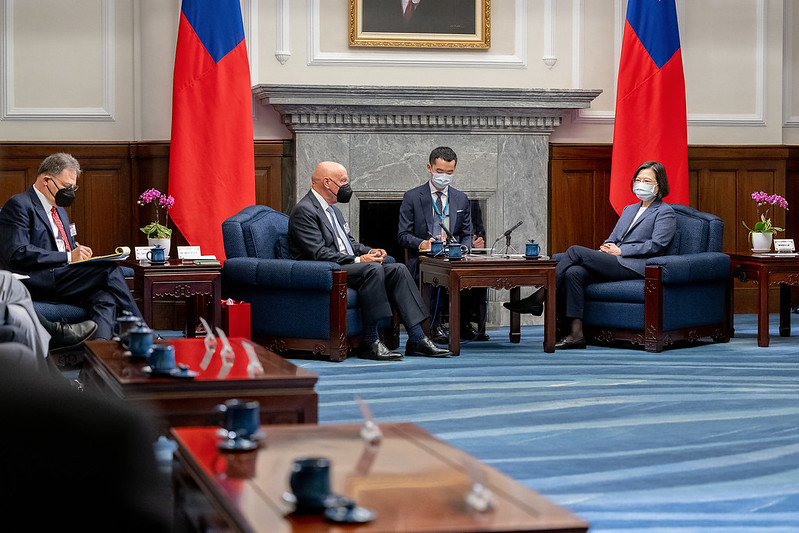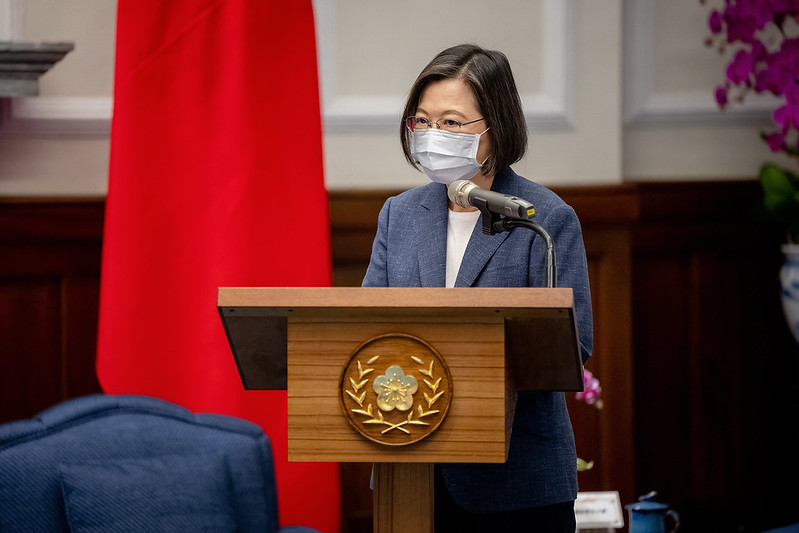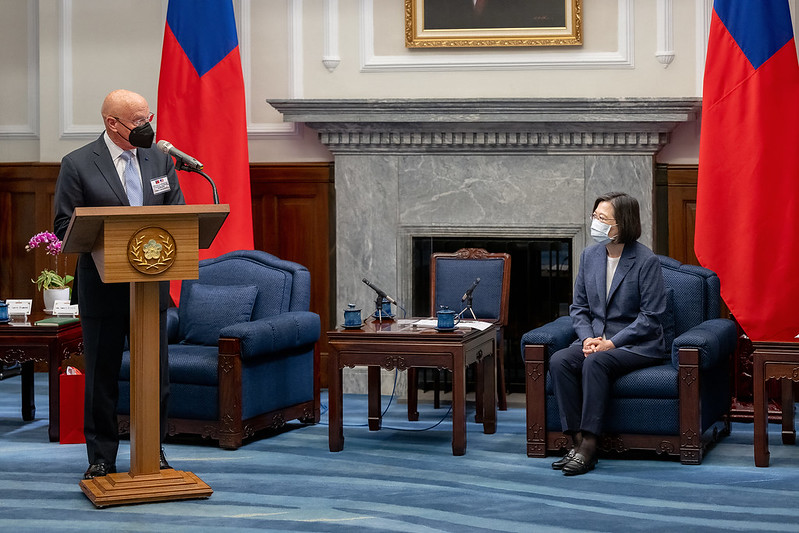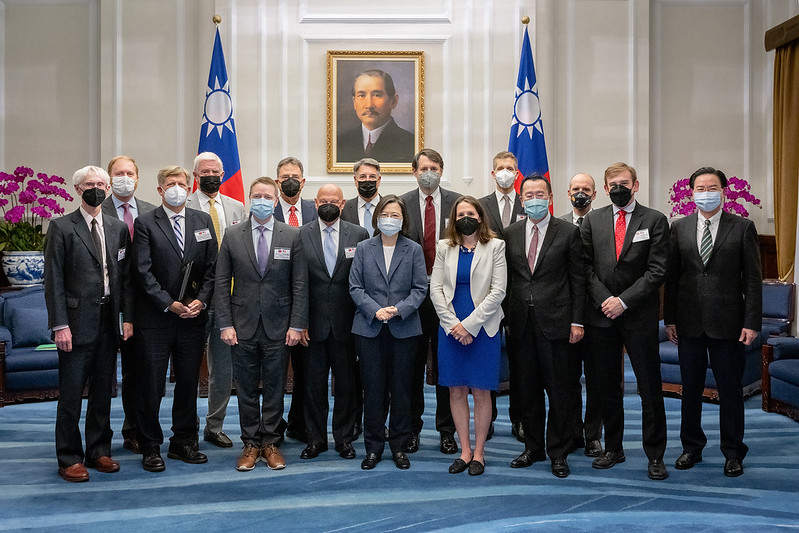News & activities
 News releases
News releases
On the morning of August 23, President Tsai Ing-wen met with a delegation of experts from the Hoover Institution at Stanford University and affiliates involved in its Project on Taiwan in the Indo-Pacific Region. In remarks, President Tsai said that the August 23 Artillery War of 1958 showed the world that no threat can or will shake the resolve of the Taiwanese people to defend our nation. The president called upon democratic partners to strengthen our alliances in order to jointly defend against interference by authoritarian states and protect regional peace and stability, and expressed hope that Taiwan and the US can deepen cooperation across all areas to create greater stability and prosperity for our peoples.
A translation of the president's remarks follows:
I welcome you all to Taiwan. Recently, a number of prominent US leaders have visited us. Now, a delegation from the Hoover Institution, led by Admiral James O. Ellis Jr. (Ret.), is also visiting Taiwan. Your traveling so far to be here at this critical moment is particularly meaningful.
The Hoover Institution is one of the most influential US public policy think tanks. Its research serves as an important reference in US government policymaking. It is also an authoritative source from which the international community draws its understanding of the situation across the Taiwan Strait. In particular, the Hoover Institution has focused on the threats posed by China as one of its core areas of research. Combined with the work of its Project on Taiwan in the Indo-Pacific Region and its Task Force on National Security, this has created a broader discussion of Taiwan-related issues, and has thereby raised recognition of and support for Taiwan. For this, I would like to extend my appreciation to the entire Hoover research team.
Russia's invasion of Ukraine this year has highlighted the continuing expansion of authoritarianism. In standing up to fight for and defend their homeland, the people of Ukraine have been a great inspiration to the rest of the world. They have shown the necessity of safeguarding one's own freedom and democracy.
Sixty-four years ago, during the August 23 Artillery War of 1958, our soldiers and civilians operated in solidarity and safeguarded Taiwan, thanks to which we have the democratic Taiwan of today. That battle to protect our homeland showed the world that no threat of any kind can shake the Taiwanese people's resolve to defend their nation – not in the past, not now, and not in the future. We, too, will show the world that the people of Taiwan have both the resolve and the confidence to safeguard peace, security, freedom, and prosperity for ourselves.
Recently, China's military exercises in areas around Taiwan have posed significant threats to the status quo across the Taiwan Strait and throughout the region. Countries in the region and global democratic partners have expressed serious concern about China's actions. At the same time, these challenges have also reminded us that we democratic partners must strengthen our alliances to jointly defend against interference by authoritarian states and protect regional peace and stability.
I would like to thank the US and other G7 members for their staunch support for Taiwan, which has once again strengthened our determination to consolidate our self-defense capabilities. As Taiwan stands on the frontline of authoritarian expansionism, we continue to bolster our autonomy in national defense. We will also continue to work with the US on this front.
With autocracy continuing to make inroads around the globe, Taiwan and the US should also be working together to build safer and more resilient supply chains. This is one of our key priorities.
Just last week, Taiwan and the US together announced the start of negotiations under the framework of the US-Taiwan Initiative on 21st-Century Trade. Through this platform, we hope to move toward a high-quality trade agreement between Taiwan and the US and deepen our cooperation in all areas. We believe such cooperation will attract more international investments to Taiwan and provide more incentives for Taiwan to invest in the US. This win-win situation will create greater stability and prosperity for the peoples of Taiwan and the US.
Admiral Ellis then delivered remarks, a transcript of which follows:
Madam President, we are deeply honored by the courtesy you have extended in meeting this morning with our Hoover Institution delegation.
We are a diverse group of specialists on Taiwan, the People's Republic of China, and United States foreign policy and national security. We have different political leanings and different views on domestic and foreign policy issues. However, we all share a deep admiration for what Taiwan has achieved as a democracy, as an open society, and as one of the world's most dynamic and innovative economies.
And thus, we come with deep concern about the escalating threats to peace and stability for the people of Taiwan and the Indo-Pacific region, as well as the growing challenges to the security of semiconductor and other supply chains on which the entire world depends.
Now, more than ever, we believe it is important for individuals and institutions in the United States and other countries to demonstrate support for Taiwan's right to exist as a self-governing democracy; to cooperate with its vibrant private enterprises, particularly in the high-tech sector; and to maintain close connection to, and solidarity with, Taiwan's creative and freedom-loving people.
We would like to express again our appreciation to the government of Taiwan, and especially to the Ministry of Foreign Affairs, for its generous cooperation in hosting our delegation and helping to arrange meetings for us with numerous leaders in and outside of government.
We also want to acknowledge your government's cooperation in ensuring that we have an opportunity to hear from diverse parties and points of view during our stay in Taiwan. After all, a core distinction between democracy and autocracy is that democracies embrace pluralism, and recognize the fundamental truth that no one leader or party has, or should pretend they have, a monopoly on the truth.
Taiwan's hard-won standing as one of the most liberal democracies of the post-Cold War world is a major reason why it enjoys such admiration and broad and deep support in the United States and elsewhere in the world.
We have come here principally to listen and to learn. But our presence here also reaffirms the ongoing commitment of the American people to deepening cooperation between the United States and Taiwan. Consistent with the Taiwan Relations Act, part of this cooperation involves strengthening Taiwan's capacities for self-defense as well as the ability of the United States to deter and resist any resort to force across the Taiwan Strait.
As you noted in your gracious remarks, effective self-defense involves more than purely military capabilities. It also requires a clear demonstration of both readiness and will, along with vigilance on many levels to counter intimidation, disinformation, and gray-zone intrusion.
As you also noted in your remarks, these tasks have taken on new urgency in the wake of the Russian invasion of Ukraine. It is important that we all learn appropriate lessons from that conflict, including the complex requirements of deterrence, the scope for miscalculation by authoritarian actors determined to achieve political objectives, and the considerable potential for large numbers of small, lethal, resilient, and distributed weapons systems to help repel a powerful aggressor.
At the same time, we want to explore and highlight the scope for mutually beneficial cooperation between Taiwan and the US in areas such as high technology, manufacturing, healthcare, education, energy, climate, and other forms of trade and exchange.
The most successful and enduring forms of cooperation among peoples are based on shared values, in particular the common commitment that open societies have to democracy, to freedom of expression, and to the rule of law. The importance of these values to Taiwan's continuing security should not be underestimated.
We look forward to listening and to learning. We will use the knowledge we've gained to consider how we might best counsel the United States to help maintain peace in the Taiwan Strait and freedom and prosperity in Taiwan and throughout the Indo-Pacific region. Thank you.
Among the members of the delegation were Hoover Institution Senior Fellow Dr. Larry Diamond, Hoover Institution Distinguished Visiting Fellow Mr. Matthew Pottinger, former US Ambassador to Russia Michael McFaul, and former US Ambassador to Portugal Thomas Stephenson.












